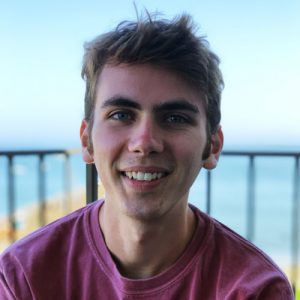
A Queer Faith
For Pride Month, we asked members of our Springtide Ambassadors Program (SAP) who identify as LGBTQ+ to reflect upon: “How does your identity as a member of the LGBTQ+ community affect your religious belief or spirituality? Are the two intertwined for you? If they’re not, tell why your faith identity and your sexuality and/or gender exist separately for you.” In this post, SAP member Anthony talks about how exploring of the intersection of his faith and sexuality has been a path filled with both struggles and joys.
Before I knew I was gay, I belonged in a church. I grew up going to Sunday school, memorizing Bible verses and taking pride in their flawless recitation. I attended Vacation Bible School and was involved in the youth group once high school came around. I was a leader, trusted to teach and lead my peers. Church was my home; everyone knew me and was proud of me, and I knew everyone else. I felt a sense of belonging within this adopted, spiritual family. My faith was “strong,” my beliefs were unmoving, and my mind was made up: this was God’s kingdom come on Earth.
At that time, I was in a state of denial about my sexuality. The way Christianity was taught to me did not allow for my full existence within this sacred community, so I hid that part of myself in public and hated that part of myself in private. I was riding the wave of ecstasy that belonging there gave me. Feeling the weight of my own secret and a sense of safety within the community, I eventually decided to tell someone at church about my “burden.” Their response—something about sin and confession and repentance—shattered my perception of this heretofore perfect family and their fundamentalist faith. As my relationships with these people strained and eventually unraveled, so too did my faith.
And still, something in me could not let go of everything. I was confident, despite everything I had lost, that God existed and that they were a loving, personal entity like I had been taught. I refused to think that I was praying into the void all these years, that my hopes and desires were not heard. I dared to think that maybe God’s love didn’t stop at the edge of my existence. And my understanding of God expanded.
Crucial to that growth—believing that God could love me—was finding a community of others who understood the evangelical world I came from and yet believed that I, too, belonged among God’s people. In the safety of these friendships I came to terms with my sexuality, wrestled with the Christianity that had been handed down to me, and reimagined my faith so that it aligned with my lived experience. Without a church to call home, my friends are truly the stabilizing agents of my faith at this juncture; they give me a sense of community, and reinforce what I believe to be true about myself, in light of our faith, in the way that they love me.
My faith and my sexuality are frustratingly intertwined. Very often I wish that they were not, but they are connected for me because of what I was taught in religious spaces to believe about LGBTQ+ people like myself. And at the same time, I found in the rubble of my religion the spiritual resources to bind my wounds, the truths I needed to hear to not give up on life or faith. It is peculiar how something can be both the source of so much hurt and so much hope. So yeah, it’s complicated; my faith and sexuality are bonded by both trauma and life-giving hope.
Learning to trust religious people again has been a slow and challenging process. Choosing to engage with religious communities as a queer person still feels like a risk, even if they fly rainbow flags in their churches. Still, I hope to one day feel at home again in a church, to let that overwhelming sense of belonging and connection wash over me as we sing and chant something we all know to be true. I pray for a future where our—queer—love no longer complicates our relationship to the Divine or to each other.

Anthony
Springtide Ambassador (22 – California)



